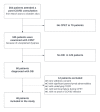Dysfunctional breathing symptoms, functional impact and quality of life in patients with long COVID-19: a prospective case series
- PMID: 37433720
- PMCID: PMC10347459
- DOI: 10.1136/bmjresp-2023-001770
Dysfunctional breathing symptoms, functional impact and quality of life in patients with long COVID-19: a prospective case series
Abstract
Background: Dysfunctional breathing is increasingly recognised after SARS-CoV-2 infection, but the associated symptoms, functional impact and quality of life have not been systematically studied.
Methods: This study describes a prospective case series of 48 patients with dysfunctional breathing based on compatible symptoms and an abnormal breathing pattern during cardiopulmonary exercise testing. Patients with underlying disease that could explain these symptoms were excluded. Median time from COVID-19 to evaluation was 212 (IQR 121) days. Self-administered questionnaires, including the Nijmegen questionnaire, Short-Form (36) Health Survey (SF-36), Hospital Anxiety and Depression Scale, modified Medical Research Council scale, post-COVID-19 Functional Scale, and specific long COVID symptoms, were the outcome measures.
Results: On average, mean V'O2 was preserved. Pulmonary function tests were within limits of normality. Hyperventilation, periodic deep sighs/erratic breathing and mixed types of dysfunctional breathing were diagnosed in 20.8%, 47.1% and 33.3% of patients, respectively. After dyspnoea, the five most frequent symptoms using the Nijmegen scale with a cut-off of ≥3 were faster/deeper breathing (75.6%), palpitations (63.8%), sighs (48.7%), unable to breathe deeply (46.3%) and yawning (46.2%). Median Nijmegen and Hospital Anxiety and Depression Scale scores were 28 (IQR 20) and 16.5 (IQR 11), respectively. SF-36 scores were lower than the reference value.
Conclusions: Long COVID patients with dysfunctional breathing have a high burden of symptoms, functional impact and a low quality of life, despite no or negligible organic damage.
Keywords: COVID-19; Exercise; Respiratory Infection; Viral infection.
© Author(s) (or their employer(s)) 2023. Re-use permitted under CC BY-NC. No commercial re-use. See rights and permissions. Published by BMJ.
Conflict of interest statement
Competing interests: None declared.
Figures


Similar articles
-
Dysfunctional breathing diagnosed by cardiopulmonary exercise testing in 'long COVID' patients with persistent dyspnoea.BMJ Open Respir Res. 2022 Mar;9(1):e001126. doi: 10.1136/bmjresp-2021-001126. BMJ Open Respir Res. 2022. PMID: 35354589 Free PMC article.
-
Dyspnea and long COVID patients.Am J Med Sci. 2024 Oct;368(4):399-404. doi: 10.1016/j.amjms.2024.07.024. Epub 2024 Jul 17. Am J Med Sci. 2024. PMID: 39029739 Review.
-
Pulmonary recovery directly after COVID-19 and in Long-COVID.Respir Physiol Neurobiol. 2023 Sep;315:104112. doi: 10.1016/j.resp.2023.104112. Epub 2023 Jul 3. Respir Physiol Neurobiol. 2023. PMID: 37406842
-
Use of Cardiopulmonary Exercise Testing to Evaluate Long COVID-19 Symptoms in Adults: A Systematic Review and Meta-analysis.JAMA Netw Open. 2022 Oct 3;5(10):e2236057. doi: 10.1001/jamanetworkopen.2022.36057. JAMA Netw Open. 2022. PMID: 36223120 Free PMC article.
-
Cardiopulmonary exercise capacity and limitations 3 months after COVID-19 hospitalisation.Eur Respir J. 2021 Aug 26;58(2):2100996. doi: 10.1183/13993003.00996-2021. Print 2021 Aug. Eur Respir J. 2021. PMID: 34210791 Free PMC article.
Cited by
-
Persistent symptoms and clinical findings in adults with post-acute sequelae of COVID-19/post-COVID-19 syndrome in the second year after acute infection: A population-based, nested case-control study.PLoS Med. 2025 Jan 23;22(1):e1004511. doi: 10.1371/journal.pmed.1004511. eCollection 2025 Jan. PLoS Med. 2025. PMID: 39847575 Free PMC article.
-
Characterization of dysfunctional breathing using cardiopulmonary exercise testing.Physiol Rep. 2025 Jun;13(11):e70388. doi: 10.14814/phy2.70388. Physiol Rep. 2025. PMID: 40457726 Free PMC article.
-
Dysfunctional Breathing in Children: A Literature Review.Children (Basel). 2024 May 6;11(5):556. doi: 10.3390/children11050556. Children (Basel). 2024. PMID: 38790551 Free PMC article. Review.
-
Decreased physical performance despite objective and subjective maximal exhaustion in post-COVID-19 individuals with fatigue.Eur J Med Res. 2023 Aug 26;28(1):298. doi: 10.1186/s40001-023-01274-5. Eur J Med Res. 2023. PMID: 37633931 Free PMC article.
-
Factors associated with phenotypes of dyspnea in post-COVID-19 condition: a cross-sectional study.Sci Rep. 2024 Jun 11;14(1):13387. doi: 10.1038/s41598-024-64370-4. Sci Rep. 2024. PMID: 38862585 Free PMC article.
References
MeSH terms
LinkOut - more resources
Full Text Sources
Medical
Miscellaneous
